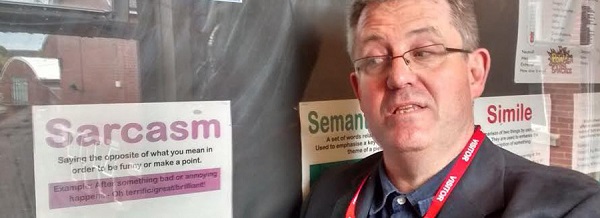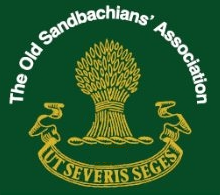
Who went on to work for the world’s oldest newspapers – The Observer and The Times – as had Kim Philby. Unfortunately, Nick’s own application to join MI6 must have got lost in the post. So he has bidden his time writing about spies and one of his books is being made into a film by Tom Hanks. He has a thriller out later this year. For the rest of the time, he writes books, adaptations, scripts, shopping lists and tweets as @thievesbook.
One of the more ridiculous things adults sometimes say is “If you can’t do anything else, teach”. Utter nonsense because if – like me – you have no other discernible talent (apart from rubbing people up the wrong way), you have two options available. One is to get ground down into high protein fish food. The other? To become a writer. As someone who has been scribbling for nearly forty years now, if I had not gone to Sandbach School, I would have long since been reduced to oh so much goldfish shit at the bottom of a fishtank.
Forty years ago, I was preparing to balls up my “A” Levels. Obviously, I didn’t say that to people at the time, but it was pretty obvious what was what was going to happen. The great irony is that come results day, George Bliss, the Deputy Head and terrifying Herr Obergruppenführer of school behaviour, actually smiled at me. “You’ve done better than we thought,” he said, which, after something like five years of barely concealed hatred and uncontrolled snippiness, was nice of him.
I was out by one grade in each subject so I wasn’t too despondent.
And then I got into university by clearing, which was probably the best thing that ever happened to me. In that dawn of time, twas indeed the luckiest break of all. Oddly enough, I recently learned it had all been in vain. My mum – who worked at Welsby’s Chemists for a time – revealed something which would have been priceless intelligence at the time. Namely, that each parents’ night she recognised most of my teachers as gentlemen who came in of a Friday and bought “something for the weekend”. Why she didn’t say anything then, I don’t know.
But it would have been A Grades all the way.
“Hello sir, how was your weekend? Ribbed and lubricated, eh? Leave the money in an envelope in the bike shed and here is what I want you to write in my end of term report.”
What I actually treasure most is receiving the greatest accolade of all from Geoff Piggott in one such report: “A good fog”. Well that’s what his handwriting looked like, and others got the same signal honour. I was chuffed because – and I am not making this up – I was weather monitor at the time. As with Ripping Yarns’ Eric Olthwaite, I really was a boring little tit when it came to precipitation and rainfall gauges. Most contemporaries from school will also recall my Doogie Howser, space cadet years. I am somewhere between an urban myth and a trivial pursuit question – “Who is the youngest Brit to have worked at NASA’s Jet Propulsion Laboratory” and that was I.
School was like that. You could do anything and nobody was surprised when I did.
So what I learned from school – apart from the fact there is more land mass in the Northern Hemisphere – was to plough my own furrow. That, and realising that nobody likes a Smart Arse. After my space cadet summer, I was called in to see the Head, who on a good day did a passable impression of Darth Vader. The conversation was priceless. The idea was to chivvy me along and remind me to knuckle down to some work. Within about ten milliseconds, he stuck the boot in.
“You think you are clever, you are too clever by half, you like taking the mickey, but you never stick at anything, you enjoy making trouble, you have the gift of the gab….” and that was the nicest part. If that isn’t a job description for a newspaper journalist, I don’t know what is.
Much has been made of the unfairness of the Grammar School system, but nowhere have I ever seen anything on what it really meant on a daily basis – namely that you wouldn’t get your head kicked in on Platt Avenue. That was – metaphorically at least – the role of teachers. Most were all salaried eccentrics and some were the most subversive lunatics I have ever encountered. I was utterly in awe of them. Exhibit A: the art teacher who took his clothes off and sat in a dustbin of mud during a house assembly. Another who played “Razzle In My Pocket” by Ian Dury to us – an unrepentant paean to the joys of shoplifting porn mags from street markets – as being worthy of Shakespeare.
And more than anything, we weren’t told what to think. We were shown how to. Ideological purity was thankfully absent from our education.
Invariably, however, we were told what to do.
Consider the end of term after the first year. I remember quite vividly being told I would be doing Latin. Latin! I don’t think I was ever in such a rat bate when I found out. I wanted to do German, as did most people: but a funny thing happened on the way to Form 2L. I actually fell in love with the subject and in Andrew (“A.J.”) Wood probably the best teacher I have ever had. Without him, I wouldn’t have finished this piece until 2028. Thank you for the appreciation of language, sir.
I should also mention an English teacher called Stephen Adams (known as “Ernie” for some reason). He introduced us to Watership Down by Richard Adams, probably still my favourite book, remarkable because I hated it at first. In one lesson, I recall probably the finest piece of quicksilver wit when someone realised the teacher, a classmate and author all had the same surname.
“Mr. Adams, I asked Adams what Adams meant and he was adamant.” (Five years later he might actually have dressed as Adam Ant).
Thank you for everything, Sandbach School.
To anyone else about to screw up your A Levels, don’t worry. Use every disadvantage to your advantage; don’t worry if you don’t make the grade: and that piece of Latin adorning your breast pocket? Words to live by – what you sow, so shall you reap – that, and my own: what a lucky break it was to have been there, in that glorious dawn when anything and everything seemed possible.
Nicholas Booth
(1975-1982)

